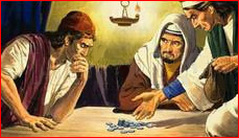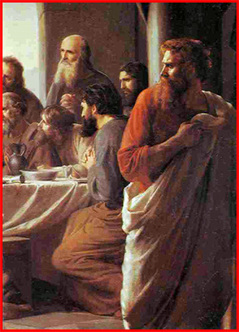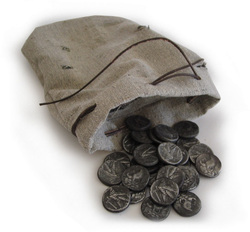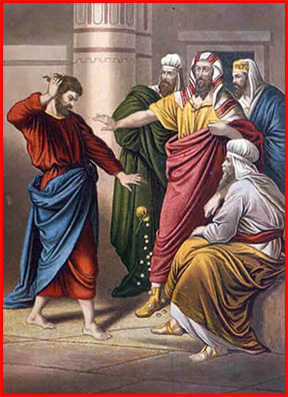| Devotion to Our Lady |
|
- Homepage
-
Daily Thoughts
- 2023 October Daily Thoughts
- Daily Thoughts Lent 2020
- Daily Thoughts for Advent 2019
- Daily Thoughts for October 2019
- Daily Thoughts for September 2019
- Daily Thoughts for August 2019
- Daily Thoughts for July
- Daily Thoughts for June
- Daily Thoughts for Easter 2019
- Daily Thoughts for Lent 2019
- Daily Thoughts for Christmas
- Daily Thoughts Easter 2022
- Consecration
- Easter Season
-
Spiritual Life
- Holy Mass Explained
- First Friday Devotions
- First Saturday Devotions
- The Mercy of God
- Vocations
- The Path Everyone Must Walk >
- Gift of Failure
- Halloween or Hell-O-Ween?
- Ignatian Spiritual Exercises >
- Meditation is Soul-Saving
- Spiritual Communion
- Miraculous Medal
- Enrollment in Miraculous Medal
- St. Benedict Medal
- Holy Water
- Advice on Prayer
- Your Daily Mary
-
Prayers
- September Devotions
- Seven Sorrows of Our Lady
-
Novenas
>
- NV-Help of Christians
- NV-Nativity of Our Lady
- NV-Seven Sorrows
- NV- Sorrowful Heart
- NV-Pope St Pius X
- NV-La Salette
- NV-St Michael Archangel
- NV-Immaculate Heart
- NV-Assumption
- NV-Novena for Fathers
- NV-Novena for Your Mother
- NV-St Raphael Archangel
- NV-Souls in Purgatory
- NV-All Saints Day
- NV-Christ the King
- NV-Divine Motherhood
- NV-Guardian Angels
- NV-Rosary
- NV-Mirac Med
- NV- Imm Conc
- NV - Guadalupe
- NV - Nativity of Jesus
- NV-Epiphany
- NV-OL Good Success
- NV-Lourdes
- NV-St Patrick
- NV-St Joseph
- NV-Annunciation
- NV-St Louis de Montfort
- NV-OL Good Counsel
- NV-Last Supper
- NV-Passion
- NV-Pentecost
- NV-Ascension
- NV-Sacred Heart
- NV-Sacred Heart & Perpetual Help
- NV-Corpus Christi
- NV-OL of Perpetual Help
- NV-Queenship BVM
- NV-OL of Mount Carmel
- NV-St Mary Magdalen
- NV- Im Hrt
- August Devotions to IHM
- Immaculate Heart of Mary
- Litany of Dependence
- Prayers to St Mary Magdalen
- Prayers in Times of Sickness Disease & Danger
- Holy Souls in Purgatory
- Meditations on the Litany of Our Lady
- Special Feast Days
- Prayers to Mary (Mon-Sun)
- Litanies to Our Lady >
- Various & Special Needs
- Our Lady of the Rosary
- Our Lady of Mt. Carmel
- Our Lady of Perpetual Help
- Our Lady of Guadalupe
- Other titles of Our Lady
-
Rosary
- Downloads
-
Holy Week
- Last Seven Words of Jesus >
- Characters of Passion >
- The Last Days of Christ
- Before Palm Sunday
- Palm Sunday
- Monday in Holy Week
- Tuesday in Holy Week
- Wednesday in Holy Week
- Holy Thursday (Last Supper)
- Holy Thursday (Agony & Arrest)
- Night Vigil with Christ
- Good Friday (Pilate & Herod)
- Good Friday (Way of Cross & Crucifixion)
- Saturday in Holy Week
-
Lent
- Ideas for Lent
- Daily Lenten Planner
- Daily Lenten Liturgy
- From Cold to Hot
- Lent with Aquinas
- Lent with Dom Gueranger
- Virtues for Lent
- History of Penance
- How Expensive is Sin?
- Confession of Sins
- Letter to Friends of the Cross
- Sermons for Lent
- Stations of the Cross >
- Lenten Prayers
- 7 Penitential Psalms
- Lenten Psalms SUN
- Lenten Psalms MON
- Lenten Psalms TUE
- Lenten Psalms WED
- Lenten Psalms THU
- Lenten Psalms FRI
- Lenten Psalms SAT
- Lenten Laughs
- Septuagesima
-
Christmas
- Epiphany Explained
- Suggestions for Christmas
- Food For Thought
- Christmas with Aquinas
- Christmas with Dom Gueranger
- Christmas Prayers
- Candles & Candlemas
- Christmas Sermons
- Christmas Prayers SUN
- Christmas Prayers MON
- Christmas Prayers TUE
- Christmas Prayers WED
- Christmas Prayers THU
- Christmas Prayers FRI
- Christmas Prayers SAT
- Twelve Days of Christmas >
-
Advent Journey
- Purgatory
- Christ the King
- Legion of Mary
- Scapular
- Sacred Heart
-
Saints
-
Martyrs for the Faith
>
- Your Daily Martyr >
- All 365 Days of Martyrs
- Cristeros
- St Valentine & Valentine's Day
- Martyrs--Thomas Becket
- Martyrs--John the Apostle
- Holy Machabees
- Age of Martyrdom
- Carmelites of Compiegne
- Martyrs--Peter & Paul
- Martyrs--John the Baptist
- Martyrs--Andrew
- Martyrs--James the Great
- Martyrs--North American
- Martyrs--Seven Holy Sleepers
- Martyrs--Afra
- School of Martyrdom
- Martyrs--Christina
- Desert Saints >
- Saints for Sinners >
- Saints of Mary >
- History of All Saints Day
-
Martyrs for the Faith
>
- Precious Blood
- Holy Ghost
- Synod 2023
-
Catechism
- Catechism Lesson 1
- Catechism Lesson 2
- Catechism Lesson 3
- Catechism Lesson 4
- Catechism Lesson 5
- Catechism Lesson 6
- Catechism Lesson 7
- Catechism Lesson 8
- Catechism Lesson 9
- Catechism Lesson 10
- Catechism Lesson 11
- Catechism Lesson 12
- Catechism Lesson 13
- Catechism Lesson 14
- Catechism Lesson 15
- Catechism Lesson 16
- Catechism Lesson 17
- Catechism Lesson 18
- Catechism Lesson 19
- Catechism Lesson 20
- Catechism Lesson 21
- Catechism Lesson 22
- Bible Study
-
Calendar
- Miracles
- Apparitions
- Shrines
- Prophecies
- Angels Homepage
- Hell
-
Church Crisis
- Conspiracy Theories
- Amazon Synod 2019 >
- Liberalism & Modernism
- Modernism--Encyclical Pascendi
- Modernism & Children
- Modernism--Documents
- The Francis Pages
- Church Enemies on Francis
- Francis Quotes
- Amoris Laetitia Critique
- Danger of Ignorance (Pius X)
- Restore all In Christ (Pius X)
- Catholic Action (Pius X)
- Another TITANIC Disaster?
- The "Errors of Russia"
- CRISIS PRAYERS
- Election Novena 2024
- The Anger Room
- War Zone
- Life of Mary
- Spiritual Gym
- Stupidity
- Coronavirus and Catholicism
- History & Facts
- Books
- Catholic Family
- Children
- Daily Quiz
-
Novena Church & Pope
- Day 01 Church-Pope Novena
- Day 02 Church-Pope Novena
- Day 03 Church-Pope Novena
- Day 04 Church-Pope Novena
- Day 05 Church-Pope Novena
- Day 06 Church-Pope Novena
- Day 07 Church-Pope Novena
- Day 08 Church-Pope Novena
- Day 09 Church-Pope Novena
- Day 10 Church-Pope Novena
- Day 11 Church-Pope Novena
- Day 12 Church-Pope Novena
- Day 13 Church-Pope Novena
- Day 14 Church-Pope Novena
- Day 15 Church-Pope Novena
- Day 16 Church-Pope Novena
- Day 17 Church-Pope Novena
- Day 18 Church-Pope Novena
- Day 19 Church-Pope Novena
- Day 20 Church-Pope Novena
- Day 21 Church-Pope Novena
- Day 22 Church-Pope Novena
- Day 23 Church-Pope Novena
- Day 24 Church-Pope Novena
- Day 25 Church-Pope Novena
- Day 26 Church-Pope Novena
- Day 27 Church-Pope Novena
- Day 28 Church-Pope Novena
- Day 29 Church-Pope Novena
- Day 30 Church-Pope Novena
- Day 31 Church-Pope Novena
- Day 32 Church-Pope Novena
- Day 33 Church-Pope Novena
- Day 34 Church-Pope Novena
- Day 35 Church-Pope Novena
- Day 36 Church-Pope Novena
- Day 37 Church-Pope Novena
- Day 38 Church-Pope Novena
- Day 39 Church-Pope Novena
- Day 40 Church-Pope Novena
- Day 41 Church-Pope Novena
- Day 42 Church-Pope Novena
- Day 43 Church-Pope Novena
- Day 44 Church-Pope Novena
- Day 45 Church-Pope Novena
- Day 46 Church-Pope Novena
- Day 47 Church-Pope Novena
- Day 48 Church-Pope Novena
- Day 49 Church-Pope Novena
- Day 50 Church-Pope Novena
- Day 51 Church-Pope Novena
- Day 52 Church-Pope Novena
- Day 53 Church-Pope Novena
- Day 54 Church-Pope Novena
- Penance Novena
- Daily WeAtheR Forecast
The Greatest and Most Important Week in the Church's Liturgical Year
CLICK ON ANY HOLY WEEK LINK BELOW
Also lots of LENTEN & HOLY WEEK DOWNLOADS on the downloads page (click here)
LITURGICAL PRAYERS FOR EACH DAY OF THE WEEK DURING LENT
| Sundays of Lent | Mondays of Lent | Tuesdays of Lent | Wednesdays of Lent | Thursdays of Lent | Fridays of Lent | Saturdays of Lent |
HOLY WEEK PAGES
| Daily Thoughts | Holy Week Main Page | Before Palm Sunday | Palm Sunday | Last Days of Christ |
| Holy Thursday Last Supper Novena | Good Friday Passion Novena |
| Monday of Holy Week | Tuesday of Holy Week | Wednesday of Holy Week | Holy Thursday (Last Supper) | Holy Thursday (Agony & Arrest) |
| Night Vigil With Christ | Good Friday (Pilate & Herod) | Good Friday (Way of Cross & Crucifixion) | Holy Saturday |
THE CHIEF CHARACTERS OF THE PASSION
| Characters of the Passion Mainpage | The Sanhedrin | Pharisees | Scribes | Saducees | Jewish Crowd | Roman Rulers |
| Judas | Annas & Caiphas | Pontius Pilate | Herod | Barabbas | Dismas the Good Thief | St. Peter | St. John | Mary Magdalen |
THE FOURTEEN STATIONS OF THE CROSS
| Introduction to the Stations of the Cross | Short Version of the Stations of the Cross (all 14 on one page) | 1st Station | 2nd Station | 3rd Station |
| 4th Station | 5th Station | 6th Station | 7th Station | 8th Station | 9th Station | 10th Station | 11th Station | 12th Station | 13th Station | 14th Station |
THE LAST SEVEN WORDS OF JESUS FROM THE CROSS
| Seven Last Words on the Cross (Introduction) | The 1st Word on the Cross | The 2nd Word on the Cross | The 3rd Word on the Cross |
| The 4th Word on the Cross | The 5th Word on the Cross | The 6th Word on the Cross | The 7th Word on the Cross |
PRAYERS AND DEVOTIONS TO THE SEVEN SORROWS OF OUR LADY
| Seven Sorrows Meditations | Short Prayers & Short Seven Sorrows Rosary | Longer Seven Sorrows Rosary |
| 1st Sorrow of Our Lady | 2nd Sorrow of Our Lady | 3rd Sorrow of Our Lady | 4th Sorrow of Our Lady |
| 5th Sorrow of Our Lady | 6th Sorrow of Our Lady | 7th Sorrow of Our Lady |
| Novena #1 to the Sorrowful Heart of Mary | Novena #2 to the Sorrowful Heart of Mary |
LENTEN PAGES
| ASH WEDNESDAY COUNTDOWN | LENT (MAIN PAGE) | DAILY THOUGHTS | DAILY LENTEN LITURGY | DAILY LENTEN PLANNER |
| LENTEN PRAYERS | THE 7 PENITENTIAL PSALMS | IDEAS FOR PENANCE | LENT WITH AQUINAS | LENT WITH DOM GUERANGER |
| HISTORY OF PENANCE | PENANCES OF THE SAINTS | HOW EXPENSIVE IS SIN? | CONFESSION OF SINS | ARE FEW SOULS SAVED? |
| VIRTUES FOR LENT | FROM COLD TO HOT | LENTEN LAUGHS | SERMONS FOR LENT | LETTER TO FRIENDS OF THE CROSS |
| STATIONS OF THE CROSS (INDIVIDUALLY) | ALL 14 STATIONS OF THE CROSS |
| THE LAST DAYS OF CHRIST | SPECIAL HOLY WEEK PAGES |
CLICK ON ANY HOLY WEEK LINK BELOW
Also lots of LENTEN & HOLY WEEK DOWNLOADS on the downloads page (click here)
LITURGICAL PRAYERS FOR EACH DAY OF THE WEEK DURING LENT
| Sundays of Lent | Mondays of Lent | Tuesdays of Lent | Wednesdays of Lent | Thursdays of Lent | Fridays of Lent | Saturdays of Lent |
HOLY WEEK PAGES
| Daily Thoughts | Holy Week Main Page | Before Palm Sunday | Palm Sunday | Last Days of Christ |
| Holy Thursday Last Supper Novena | Good Friday Passion Novena |
| Monday of Holy Week | Tuesday of Holy Week | Wednesday of Holy Week | Holy Thursday (Last Supper) | Holy Thursday (Agony & Arrest) |
| Night Vigil With Christ | Good Friday (Pilate & Herod) | Good Friday (Way of Cross & Crucifixion) | Holy Saturday |
THE CHIEF CHARACTERS OF THE PASSION
| Characters of the Passion Mainpage | The Sanhedrin | Pharisees | Scribes | Saducees | Jewish Crowd | Roman Rulers |
| Judas | Annas & Caiphas | Pontius Pilate | Herod | Barabbas | Dismas the Good Thief | St. Peter | St. John | Mary Magdalen |
THE FOURTEEN STATIONS OF THE CROSS
| Introduction to the Stations of the Cross | Short Version of the Stations of the Cross (all 14 on one page) | 1st Station | 2nd Station | 3rd Station |
| 4th Station | 5th Station | 6th Station | 7th Station | 8th Station | 9th Station | 10th Station | 11th Station | 12th Station | 13th Station | 14th Station |
THE LAST SEVEN WORDS OF JESUS FROM THE CROSS
| Seven Last Words on the Cross (Introduction) | The 1st Word on the Cross | The 2nd Word on the Cross | The 3rd Word on the Cross |
| The 4th Word on the Cross | The 5th Word on the Cross | The 6th Word on the Cross | The 7th Word on the Cross |
PRAYERS AND DEVOTIONS TO THE SEVEN SORROWS OF OUR LADY
| Seven Sorrows Meditations | Short Prayers & Short Seven Sorrows Rosary | Longer Seven Sorrows Rosary |
| 1st Sorrow of Our Lady | 2nd Sorrow of Our Lady | 3rd Sorrow of Our Lady | 4th Sorrow of Our Lady |
| 5th Sorrow of Our Lady | 6th Sorrow of Our Lady | 7th Sorrow of Our Lady |
| Novena #1 to the Sorrowful Heart of Mary | Novena #2 to the Sorrowful Heart of Mary |
LENTEN PAGES
| ASH WEDNESDAY COUNTDOWN | LENT (MAIN PAGE) | DAILY THOUGHTS | DAILY LENTEN LITURGY | DAILY LENTEN PLANNER |
| LENTEN PRAYERS | THE 7 PENITENTIAL PSALMS | IDEAS FOR PENANCE | LENT WITH AQUINAS | LENT WITH DOM GUERANGER |
| HISTORY OF PENANCE | PENANCES OF THE SAINTS | HOW EXPENSIVE IS SIN? | CONFESSION OF SINS | ARE FEW SOULS SAVED? |
| VIRTUES FOR LENT | FROM COLD TO HOT | LENTEN LAUGHS | SERMONS FOR LENT | LETTER TO FRIENDS OF THE CROSS |
| STATIONS OF THE CROSS (INDIVIDUALLY) | ALL 14 STATIONS OF THE CROSS |
| THE LAST DAYS OF CHRIST | SPECIAL HOLY WEEK PAGES |
THE EVENTS OF WEDNESDAY IN HOLY WEEK
VENERABLE MARY OF AGREDA
The Mystical City of God
The Mystical City of God
|
On the Wednesday following His triumphal entry into
Jerusalem Christ our Lord remained at Bethany without going to Jerusalem, and
on this day the scribes and pharisees met at the house of Caiphas in order to
plan the death of the Savior of the world (Mark 14:1). The welcome, which the
Redeemer had met with among the inhabitants of Jerusalem, and which had
followed so shortly upon the resurrection of Lazarus and the many other
miracles of those days, had excited their envy to the highest pitch. Besides
they had already resolved to take away his life under the false pretext of the
public good, as Caiphas had prophesied so contrary to his intention (John 11:49).
The demon, who saw them thus determined, suggested to some of them not to execute their design on the feast of the Pasch lest the people who venerated Christ as the Messias or a great prophet, should cause a disturbance. Lucifer sought by this delay an opportunity to hinder the death of the Lord altogether. But as Judas was now entirely in the clutches of his avarice and hate, and altogether deprived of any saving grace, he came to the meeting of the priests in great disturbance and terror of mind, and began to treat with them concerning the betrayal of his Master. He closed the deal by accepting thirty pieces of silver, contenting himself with such a price for Him who contained within Himself all the treasures of heaven. In order not to lose their opportunity the priests put up with the inconvenience of its being so near the Pasch. All this was so disposed by divine Providence directing these events. At the same time happened what our Savior is recorded as saying in St. Matthew: “You know that after two days shall be the Pasch, and the Son of man shall be delivered up to be crucified” (Matthew 26:2). Judas was not present when these words were uttered by Christ; but in the same furious spirit in which he had sold Jesus, he returned to the Apostles and perfidiously began to inquire of his companions, and even of the Lord and His Blessed Mother, where they were to go from Bethany and what the Master was to do on the following few days. All this was merely a treacherous preparation of the perfidious disciple for the betrayal of his Master to the chief pharisees. Like a consummate hypocrite, Judas sought to palliate his treachery by a pretended interest and anxiety. But both the Savior and His most Blessed Mother well understood the purpose of feverish activity; for the holy angels immediately reported to them his shameful contract to which he had bound himself for thirty pieces of silver. On that very day, when the traitor approached the great Lady to ask her, where the Lord proposed to partake of the Pasch, she, with ineffable meekness, answered him: “Who can penetrate, O Judas, the secret judgments of the Most High?” Thenceforward she ceased to warn him against committing the sin; but both she and the Lord tolerated his presence, until he himself despaired of remedy and eternal salvation. But this meekest Dove, now certain of the irreparable ruin of Judas and of the delivery of her most holy Son into the hands of His enemies, broke out in tenderest lamentations in the presence of the angels, for they were the only ones with whom she could confer about her heartrending sorrow. In their presence, she permitted the sea of her sorrow to overflow and gave expression of words of greatest wisdom and affection. She excited the wonder of these holy angels, who saw such an exalted and new perfection practiced by a mere creature in the midst of bitterest sorrows and tribulations. WORDS OF THE BLESSED VIRGIN MARY SPOKEN TO SISTER MARY OF AGREDA My daughter, all that thou hast understood and written in this chapter contains great and instructive mysteries for the mortals who will meditate upon it. Prudently consider first of all, how my most holy Son, though He, in order to foil and overcome the devil, and in order to weaken his power against men, permitted him to retain the nature and the penetrating knowledge of an angel, nevertheless concealed many things from him, as thou hast already recorded in other places. In withholding them from his knowledge the Almighty foiled the malice of this dragon in a manner most befitting his sweet and irresistible Providence. On this account was the hypostatic union of the divine and the human natures concealed, and the devil was allowed to fall into so great confusion regarding this mystery and to be driven into so many cross purposes, until the Lord revealed himself and convinced him of the divine glory of his soul even from the moment of his conception. Likewise He permitted the devil to witness some of the miracles of his most holy life, and concealed from him many others. In a similar manner the Lord provides for the welfare of souls in our days, for, although the devil can by his natural powers inform himself of all the doings of each soul, God will not permit it and hides much from him for reasons of his own Providence. Afterwards He allows him to find them out for his greater humiliation. Thus after the work of the Redemption, He permitted the demon for his greater torment and confusion to become aware of so many unheeded mysteries. The infernal dragon is continually lurking about to search into the doings of souls, not only into the exterior, but into the interior activities of each soul. But my most holy Son exerts a most loving care over them ever since He was born and died for them. |
This blessed care would be much more general and continual
with many, if they themselves did not make themselves unworthy by delivering
themselves over to the enemy and listening to his deceits and his malicious and
cunning advice. Just as the virtuous and the friends of God gradually become
instruments in the hands of the Lord and resign themselves entirely to his
divine disposition, so that He alone governs and directs them and does not
allow them to be moved by other agencies; so, in like manner, many of the
reprobate and of those who are forgetful of their Creator and Redeemer and who
deliver themselves over to the devil by repeated sins, are moved and drawn into
all kinds of wickedness and are mere tools of his depraved malice. An example
of this we have in the perfidious disciple and in the murderous pharisees
persecuting their Redeemer. None of the mortals are blameless in this respect:
for, just as Judas and the priests by the use of their own free will, refused
to follow the good advice of the demon and desist from persecuting Christ our
Savior, so they could much more easily have refused to join him in persecuting
Christ, when they were first tempted. For then they were assisted by grace, if
only they wished to use it, while afterwards they were assisted only by their
own free choice and led by their bad habits. That they were in the second
instance deprived of grace and help of the Holy Ghost, was only just, because
they had given themselves up and subjected themselves to the demon. They had
made up their minds to follow him in all his malice and allow themselves to be
governed entirely by his perversity, without ever considering the goodness and
power of their Creator.
Hence you will understand that this infernal serpent can have no power to lead anyone toward the good. but very much toward leading those souls into sin, who are neglectful in issuing from their evil state. Truly I say to thee, my daughter, that if mortals would thoroughly understand this danger, they would be struck with great terror; for there is no created power, which can prevent a soul that has once yielded to sin from casting itself from abyss to abyss. Since the sin of Adam, the weight of human nature, burdened with the concupiscible and irascible passions, is drawn toward sin as the stone toward its center. Joined to this tendency are the bad habits and customs, the power of satan over those who have sinned, and his unceasing tyranny. Who is there, that is so much an enemy of his own welfare as to despise these dangers? The Almighty alone can free him and to his right hand is reserved the remedy. In spite of all this mortals live as secure and forgetful of their ruin as if each one had it in his own power to prevent and repair it at his pleasure. Though many know and openly confess that they cannot rise from their own ruin without the help of God; yet they allow this consciousness to become a mere habit and a vague sentiment and instead of lovingly seeking his aid, they offend and irritate God, expecting Him to wait upon them with his grace until they are tired of sinning or until they are unable to continue their abominable wickedness and ingratitude. Do thou fear, my dearest, this dreadful danger and beware of the first sin, for after the first sin thou wilt be still less able to resist the second, and thou increasest the power of the devil over thee. Remember that thy treasure is most valuable and the vase, in which thou carriest it, fragile: by one fall thou canst lose it all (II Cor. 4, 7). Great is the cunning and sagacity which the serpent uses against thee, and thy insight is but small. Therefore thou must collect thy senses and close them to all outward things; thou must withdraw thy interior within the wall of protection and refuge raised for thee by the Almighty, whence thou canst repel all the inhuman assaults of thy enemies. To excite this fear in thee, it will be sufficient to consider the punishment of Judas which has been made clear to thy understanding. In regard to thy imitation of my behavior in other matters: how thou shouldst act toward those who hate and persecute thee, how thou shouldst love them and bear with them in charity and patience, and how thou shouldst pray for them to the Lord with true zeal for their salvation, as I have done for the traitor Judas: in all this I have before this often exhorted thee. I desire that thou excel and distinguish thyself therein, and that thou instruct thy religious and all those with whom thou deal est in this manner of acting. For in view of the patience and meekness of my most holy Son and my own example, the wicked and all mortals shall be covered with unutterable confusion because they have not pardoned each other with fraternal charity. The sins of hate and vengeance shall be punished with greater severity than other sins on the judgment day; and in this life these vices will soonest drive away the infinite mercy of God and cause eternal punishment of men, unless they amend in sorrow. Those that are kind and sweet toward their enemies and persecutors, and who forget injuries, resemble on that account more particularly the incarnate Word: for Christ always went about seeking to pardon and to load with blessings those who were in sin. By imitating the charity and the meekness of the Lamb, the soul disposes itself to receive and maintain that noble spirit of charity and love of God and the neighbor, which makes it apt for all the influences of divine grace and benevolence. HERE ENDS THE EXTRACT FROM THE MYSTICAL CITY OF GOD |
|
The End of the Road for Judas
Now Judas comes on the scene. He has never been very much in evidence from the beginning; only an allusion here and there has evoked his presence, and these have been slight, obscure and incomprehensible before the event. There is no reason to suppose that he seemed, up to the moment when he committed his infamy, any different from the eleven others. Even on this fatal Wednesday, it would seem that the Evangelists did not wish to record any additional facts, which might explain the actions of this man, as he goes out to commit the crime which has made his name opprobrious forever. Jesus spends Wednesday in Bethany On Holy Wednesday, it has been assumed that Jesus stayed in Bethany from the fact that no teaching was given on that day. The evening before, Jesus left His disciples with a final word. "You know that after two days the paschal feast is coming; it is then that the Son of Man must be given up to be crucified" (Matthew 26:1-2). This is the fourth warning of what was to come. There is no suggestion that Jesus came into the Temple on Wednesday. We get nothing at all about the happenings of Wednesday, except as they concern Judas. Matthew and Mark, indeed, tell the story of the anointing with precious ointment from the alabaster box, and the protest of Judas so instantly dismissed by his Master, immediately before telling of the betrayal which took place on the Wednesday (some authors think that Judas met with the High Priests on Tuesday night). One imagines that Matthew and Mark put the story here in order to link Judas' resentment at the public rebuke with his betrayal of Christ, which took place on the Wednesday. There was indeed a connection between the two, but there had been four days between, to allow the resentment to fester. Judas Meets With the Priests To the south of Mount Sion rose a large palace, the residence of the High-Priests; it was there that the enemies of Jesus held their assembly and Caiphas presided over their deliberations. The Pharisees brought with them all their habitual fanaticism, the High Priests (Sadducees) showed their contempt for all belief in spiritual things, while Herod's courtiers, the Herodians, only hoped to further their own political schemes. The resolution passed was worthy of such a council. Out of fear of the populace they decided to temporize until just after the festival ceremonies were completed, and then seizing the Christ of a sudden, to put Him to death; but an unforeseen incident altered these first plans and precipitated events. The “Tuesday-betrayal’ authors are of the opinion that on Tuesday night, Judas had not followed Jesus up the Mount of Olives; but, lingering in the porches of the Temple, he had overheard a group of Temple-guards discussing how they might manage to arrest this troublesome Reformer, Who was powerful enough to hold in check the princes of the people. Other authors hold that Judas made his way back to Jerusalem on the Wednesday, since, with Our Lord staying in Bethany, it would have be a ‘day-off’ for the Apostles, which would enable Judas to slip away under one pretext or another. Matthew, Mark, and Luke all tell of the betrayal. The Passover was only two days away. The chief priests and scribes were in continual discussion as to how they might bring about the arrest and slaying of Jesus. Their problem was that he was so popular with so many of the people—not all, but enough to make a riot possible: they dared not act against him publicly, especially at a time when Jerusalem was crammed to bursting point with pilgrims who had come for the Passover. Yet it was precisely this massing together of people which would make it possible for Jesus to stir the sort of tumult that would bring the Roman soldiery into action—we know that the Romans increased their guards in the city every year at Passover as a normal precautionary measure. What Will You Pay Me? Scripture reports: One of the twelve, Judas who was called Iscariot, went to the chief priests and asked them, “What will you pay me for handing him over to you?" They were delighted at the suggestion and offered him thirty pieces of silver. They could count upon him, Judas promised, and deliberated with the priests and the magistrates how Jesus could best be arrested away from the crowd. "And he, from that time onwards, looked about for an opportunity to betray Him." (Matthew 22:14-16; Mark 14:20-11; Luke 22: 1-6). Priests and scribes were talking in the palace of the High Priest Caiphas, when there came to them a man who could solve at least part of their problem— the problem of arresting the troublemaker without causing a riot: for this man knew where Jesus would be spending the night! Judas had approached them and asked: "What will you give me, if I will deliver Him unto you?" They had recognized him as one of the Twelve who accompanied the Nazarene, and they at once reported this proposition to the Sanhedrin members. The Price of Betrayal The latter welcomed the idea with great joy. Judas, immediately introduced into their meeting, confirmed his offer, extending his hand to receive the wages of his crime. He was treated indeed like a common huckster, for the Jews, after much haggling over the sum, only allotted him thirty silver shekels, which was but the price of a slave. Pitiful as this sum seemed, the Apostle seized it. But there is an echo from the words of the Prophet Zacharias (11:12 ): "And now, said I, pay me my wages, if pay you will; if not, say no more. So they paid me for my wages thirty pieces of silver." Observe that the officials answered his question "How much?" by giving him "thirty pieces of silver". Exodus (21:32) had appointed this sum to be paid to the owner of a slave who had been gored to death by another man's ox—the penalty where a member of the family was slain was death: so that the price fixed now could hardly have been more contemptuous. And Judas took it. We are told that it was worth izo denarii: and the vase of ointment whose waste had so upset Judas had been worth 300! If resentment was the motive, why did he so eagerly ask about the price he was to be paid? If he was small enough to sell his Lord for so little, how account for the remorse which led him to suicide when he realized that Christ was to be slain? Thirty pieces of silver; thirty pieces of the silver money of the Temple—a clear proof that the priestly caste was really responsible. It was little enough for so great a crime. The figure was probably arrived at because thirty pieces of silver was the forfeit for the killing of a slave, in which case it carried a deliberate insult to Jesus. The truth is that there is too much about Judas—the man of Kerioth, the only non-Galilean among the Twelve—that we do not know. From that moment, says St. Luke, "Satan entered into him." Two days later Judas betrayed his God. Long before, Jesus had seen something in him that has not been shown to us, when He said (John 6:70), "I have chosen you Twelve, and one of you is a devil." "Satan entered into him" (Luke 22:3)—which is consoling, as far as it goes; to see Satan bringing about the death which would be his own destruction is a reminder that he is not omniscient and can make the most startling misjudgments as to his own best interests, which are never our best interests. The Mystery of Iniquity What moved Judas to commit the act which has ensured that his name would be known till the world ends? Even enemies of Christ automatically call a traitor “a Judas”. Apart from that we have Judas' resentment at the curt dismissal of his protest; and we have Saint John telling us that he was a thief, who handled—and therefore, one presumes, had mishandled—the small funds of the apostles. All the same he remains profoundly mysterious. The reason which prompted Judas will always remain obscure. St. Luke and St. John both say: "Satan found his way into the heart of Judas," and this of course is true; the spirit of evil dwells in every sinner, however obscure. The statement is probably nothing more than a figure of speech; even today Orientals will excuse themselves by saying "the devil came into me." But if the statement is accepted in its full literal meaning, how was it that Jesus, who cast out so many devils, should abandon one of his own disciples to the Adversary? If the Gospel is read literally, there would seem to be no other motive than a base desire for gain, so that the devil who came into Judas would simply be Mammon. St. John says definitely that he was a thief and that he stole from the communal purse which was entrusted to him (John 12: 6). But even so, it would seem that he had more to gain by pilfering this way than by selling his Master for such a paltry sum. We know, too, that when he realized the full result of his crime, he came to the Sanhedrin and threw the money back at them and rushed off to kill himself to escape from his inexpiable despair. So there must have been something, even in this dark soul, which Mammon did not possess. If it was not avarice, could it have been anger at what he considered deception? The first reference to the betrayal (John 6:70) lends some support to this theory. After the miracle of the loaves, Jesus escaped from the crowd who would have proclaimed Him King and, by his discourse upon the Bread of Life, he made it clear that in His doctrine there was no place for worldly ambition. Judas, if he had followed Christ only in the hope of temporal power, would at that moment revolt against Him. This reading explains Jesus's otherwise incomprehensible judgment: "One of you is a devil." Everything which occurred after that time would serve to convince Judas that there was nothing to be hoped for from Jesus and, in his fury, he might have decided to get rid of a Leader who was proving to be an embarrassment. But this theory also leaves the remorse and the suicide unexplained. We may also see him as a mean creature, proud of his trickiness and not even abashed by the obvious contempt of his paymasters; a coward ready to sink to any depth to preserve his interests or his skin. Yet it is hard to believe that Jesus would have chosen such a man and kept him among His closest disciples for two years. The Gospel is, as we have said, extremely vague about Judas, except in the matter of the actual betrayal, but such glimpses as it gives are of a character more disagreeable than cowardly, as witness his criticism of Mary spilling the perfume and later, at the Last Supper, when he "had gone out." Perhaps this irritability hid another less ignoble sentiment. Perhaps Judas was even motivated by love, not the pure disinterested love, which Peter and the other ten had for their Master, but one of those devouring, exclusive passions which can thrust a man into the worst excesses of jealousy, a love so near to hate, that, in certain circumstances, it indeed becomes hate, only to recover itself when the worst has been committed, in the extremity of pain and despair. We cannot go any further with these psychological rationalizations of the conduct of Judas, because they do not get to the heart of the matter. The arrest of Jesus by the creatures of the Sanhedrin and His iniquitous execution is not merely a slight episode in Jewish religious history and in the long tale of political injustices. It is the supreme mystery of Christianity, the mystery of the Redemption. It was necessary that Jesus should be delivered to His enemies. Physically, it had to be done by someone close to Him, to ensure silence and to prevent comment. The Prophets had foretold it "Why, the very man I trusted most, my own intimate friend, who shared my bread, has lifted his heel to trip me up" (Psalm 40:9); "Had some enemy descried me, . . . but thou, my second self, my familiar friend" (Psalm 34:13-14). Christ must experience the full weight of the baseness and villainy of man before his sacrifice could be complete. Peter says plainly that the treachery of Judas was a part of the divine plan, "a prophecy in scripture that must needs be fulfilled" (Acts 16). We must here leave the traitor, remembering those mysterious words in the Gospel which apply to no one so completely as to him: "It must needs be that such hurt should come, but woe to the man through whom it comes" (Matthew 18: 7). We will conclude with the words of St. Alphonsus Liguori, from his book The Passion and Death of Jesus Christ: PRAYER The chief priests, therefore, and the Pharisees gathered a council and said: “What shall we do, for this man doeth many miracles?” Behold, at the very time that Jesus Christ was employed in working miracles for the benefit of all, the first personages of the city assembled to plan the death of the author of life. Behold what the impious Caiphas said: “It is expedient for you that one man should die for the people, and that the whole perish, not.” From that day, says St. John, they sought a means of putting Jesus to death. Ah, Jews, fear not! This your Redeemer does not run away; no, He has come on earth to die, and by His death to deliver you and all men from eternal death! But behold, Judas presents himself to the High Priests and says: “What will you give me, and I will deliver him unto you?” Oh, how great was the joy with which the Jews exulted through the hatred that they bore to Jesus Christ, when they saw that one of his own disciples offered to betray him, and to deliver him into their hands! Let us here consider the exultation of Hell when a soul that has served Jesus Christ for several years betrays him for a miserable good or a vile pleasure. But, O Judas, since you wish to sell your God, at least demand the price which he is worth. He is an infinite good, and is therefore worth an infinite price. But, O God! You conclude the sale for thirty pieces of silver: “But they appointed him thirty pieces of silver.” Ah, my unhappy soul, leave Judas, and turn thy thoughts on thyself. Tell me for what price hast thou so often sold the grace of God to the devil? Ah, my Jesus, I am ashamed to appear before Thee when I think of the injuries I have done Thee. How often have I turned my back upon Thee, and preferred to Thee some temporal interest, the indulgence of caprice, or a momentary and vile pleasure? I knew that by such a sin I should lose Thy friendship, and I have voluntarily exchanged it for nothing. Oh that I had been dead rather than have offered Thee so great an outrage! My Jesus, I repent with my whole heart; I would wish to die of sorrow for it. Let us here consider the benignity of Jesus Christ, who, though he knew the appointment which Judas had made, did not banish him from His presence when He saw him, nor look at him with an unfriendly eye, but admitted him into His society, and even to His table, and reminded him of his treachery, for the sole purpose of making him enter into himself. When He saw him obstinate, He even prostrated himself before him, and washed his feet in order to soften his heart. Ah, my Jesus, I see that Thou dost treat me in the same manner. I have despised and betrayed Thee, and Thou dost not cast me off. Thou dost regard me with love, Thou dost admit me even to Thy table of the Holy Communion. My dear Savior, if only I had always loved Thee! And how shall I be ever again able to depart from Thy feet and renounce Thy love? |
Web Hosting by Just Host












